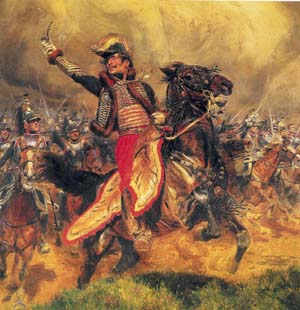The directory «Plots of stamps in the catalogue»
Lasalle Antoine Charles Louis
(1775—1809)

In an army of colourful characters one man stood apart - General Comte Antoine Charles Louis Lasalle. Not only was he brave and a brilliant cavalryman, Lasalle was also a famed hellraiser and thought that any hussar who wasn't dead by the age of 30 was a "blackguard". His many adventures included sneaking deep into Austrian territory to spend the night with a noblewoman and capturing Stettin, a heavily fortified city, and its garrison with fewer than 1000 cavalrymen. Lasalle came from a noble family and joined the army as an officer, although the French Revolution saw him dismissed. He rejoined as an enlisted man and was quickly elected to sergeant. He campaigned in Belgium and, through family friendship with the later Marshal Kellermann, became his aide. Flourishing with the challenges of staff work, the young soldier stayed with Kellermann when he transferred to Italy in 1796. Captured early on, Lasalle was exchanged and took up a love affair with a marquise in Vicenza. This led to an incident in which he led a party of troopers to his lover's house - deep within Austrian lines - and upon discovery escaped by bluffing and fighting his way out. The incident brought Lasalle to Napoleon Bonaparte's attention the morning after when he rode a captured Austrian horse on parade. His skill leading cavalry won him more promotions and his reputation was enhanced when at Rivoli he charged an Austrian brigade with only 26 men and routed it. Lasalle then took up a dangerous affair with Josephine Berthier, the sister-in-law of Marshal Berthier. Whatever potential damage that did to his career paled when considered on a personal level - as he later married her and is reported to have remained passionately devoted to his wife. He was handsome, only 5 foot 8 inches tall, and throughout his career had a succession of flambouyant moustaches. He was a superb horseman and once rode into a ball where he made his mount dance.
In Egypt he regularly battled and bested the famed mameluke horsemen - in one encounter bravely dismounting to pick up his fallen sabre - and played a major part in General Desaix's subjugation of Upper Egypt. Ever the one to create an impression - either good or bad - Lasalle adopted mameluke breeches as part of his uniform. His hellraising ways brought him notoriety, but didn't stop his brilliance handling light cavalry from shining and by 1805 he was a general of brigade. Lasalle's star was high during the 1806 campaign for Prussia where his hussars became known as the Infernal Brigade. He was one of the officers taken in by General Blucher's ruse to extricate his army after Auerstadt - a fortunate lapse in that he was massively outnumbered and could not have stopped the Prussians for long. He recovered, however, and while harrying Blucher stopped at Stettin - a city boasting 5000 defenders and almost 300 cannon - and managed to threaten it into submission with only 800 troopers at his back. Then followed battles that included Golymin, Eylau and Heilsberg. One of Lasalle's major faults was his willingness to repay brutality in kind and it was said of him he "made Spain tremble". In 1807, Lasalle joined the expedition to Spain and was responsible for the torching of Torquemada, a village that resisted his troops.
Soon afterwards he smashed Spain's General Cuesta at Cabezon. At Medina del Rio Seco, Lasalle's cavalry routed the divided Spanish armies under General Blake and Cuesta and he played a part in the French victory at Medillin. One of the few French generals to leave the Spanish Ulcer with a good military reputation, Lasalle joined the Grande Armee for its 1809 Campaign along the Danube. He arrived just prior to Napoleon's push across the Danube at Aspern-Essling and was sent to probe for the whereabouts of the Austrian army. Outnumbered, Lasalle's men fought along the good defensive ground running between the two villages - charging the Austrians to prevent them launching a coordinated attack and his determination and courage contributed to the French being able to successfully withdraw. His next assignment was at Raab with Eugene Beauharnais and then followed the massive clash at Wagram. Lasalle was killed on the second day of that battle when he was shot between the eyes while charging retreating Austrian infantry. Despite his boorish, empty-headed behaviour as a hellraiser, Lasalle was an intelligent man who suprised many with his private character and wit. When he died France lost its best light cavalry commander.
Ajman, 1970, Battle of Rivoly
Equatorial Guinea, 1977, Battle of Rivoli
Gabon, 1969, Battle of Rivoly
Yemen (Kindom), 1969, Battle of Rivoly